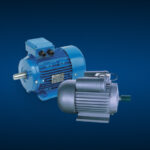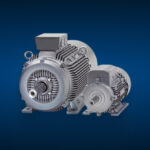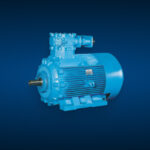Electric motors are the moving force behind numerous industrial applications; however, they may be inefficient and expensive to operate without appropriate control. Here an AC drive comes in handy. Regulating the speed and torque of AC motors improves energy efficiency, wear and tear and performance in various industries. From manufacturing to HVAC to automation, an understanding of how AC drives work and their benefits can help improve system reliability while lowering operational costs.
Understanding AC Drive
An electronic device for controlling the voltage and/or frequency of the electrical supply to an AC motor to vary speed and torque is called an AC drive. Motors traditionally run at fixed speeds but with AC drives, industries can reduce energy consumption, increase operational efficiency and extend the service life of their equipment.
Such drives are critical to manufacturing, HVAC, water treatment and transportation industries that require accurate motor speed control. Instead of running near its full capacity all the time, AC drives let motors throttle up and down to match load demands and thus waste less energy and boost productivity.
How AC Drives Work
AC drives operate on a three-stage process:
- Rectifier Stage: Changes incoming AC power to DC power, so that motor speed can be controlled easily.
- DC Link Stage: It is a buffer that removes the ripple of the DC power and supplies smooth and steady energy.
- Inverter Stage: Changes the stable DC power back to AC power with controlled frequency and voltage for motor speed adjustment.
AC drives differ in frequency and voltage so they can achieve precise speed adjustments without excessive wear of the machinery and with high energy efficiency – they are indispensable in industrial applications.
The AC drives are coming from ABB Motors, assuring the best in terms of performance, energy-saving results as well as precise motor control for a wide range of industrial application.
Also, read our blog: Top 10 Benefits Of Using ABB Motors In Industrial Applications
Types of AC Drives
Different AC drives serve different industrial needs based on power capacity, efficiency, and application.
1. Voltage Source Inverter (VSI) Drives
VSI drives are the simplest type of AC drive and the most efficient. They change dc voltage to ac voltage by pulse width modulation (PWM) to control motor speed. Such drives are energy efficient, economical and have low harmonic distortion hence providing smooth motor operation with less electrical interference. The ICs are suitable for speed control and energy-saving applications in pumps, fans, conveyors and HVAC systems.
2. Current Source Inverter (CSI) Drives
For high-power applications with steady torque and overload capability, CSI drives are preferred. Such drives do not regulate the voltage but convert DC to AC with large inductors for power stability. They provide good torque control, suited for hard industrial applications. And regenerative braking gives excess energy back to the power grid cutting overall electricity use. These CSI drives find use in rolling mills, mining equipment, large compressors, and heavy-duty industrial machinery that requires continuous reliable power.
3. Pulse Width Modulation (PWM) Drives
PWM drives provide accurate speed control of motors with low loss; it is one of the advanced classes of AC drives. Their voltage and frequency are controlled by high-speed switching transistors without any mechanical stress. The above drives are very efficient with low harmonic distortion and suitable for applications where speed adjustment is required. Robotics, CNC machines, Elevators & other precision manufacturing systems, make the most use of PWM drives due to their accuracy & efficiency.
Applications of AC Drives
AC drives find many uses in almost all industries because of their capability to control the motor speed, improve efficiency, and reduce energy consumption. The main applications are:

1. Industrial Automation
AC drives are used for controlling conveyor belts, mixers, robotic arms etc in manufacturing plants. By adjusting motor speeds to production requirements businesses can increase productivity and reduce operation costs.
2. HVAC Systems
AC drives regulate fans, and pumps in addition to compressors in HVAC systems reducing energy usage & improving temperature control within the building. Running motors at variable speeds instead of full-on makes HVAC energy efficient and cost-effective.
3. Water Treatment & Pumping
Water treatment facilities and Pumping stations use AC drives to control the pump flow rate. This prevents water hammer effects, improves pressure stability and optimizes energy consumption, especially in municipal water supply systems and wastewater treatment plants.
4. Renewable Energy Systems
AC drives control the flow rate of pumps at Water Treatment facilities/Pumping stations. It avoids water hammer effects, improves pressure stationarity, and optimizes energy consumption, especially in city water supply networks and wastewater treatment plants.
5. Transportation & Electric Vehicles
Modern electric trains, trams and industrial vehicles use AC drives for motor speed control and braking. They allow smooth acceleration, regenerative braking and accurate torque control, with less wear and better vehicle efficiency
Benefits of AC Drives

Industries all around the world select AC drives for energy saving, motor performance improvement, & maintenance cost reduction advantages.
1. Energy Efficiency
Energy reduction is one of the greatest advantages as AC drive adjusts motor speed according to load demand. Studies indicate up to 50% lower energy use than fixed-speed motors with AC drives.
2. Extended Motor Lifespan
AC drives avoid abrupt starts and stops which reduce mechanical stress on motors and associated equipment. This extends motor life, reduces maintenance costs and cuts down downtime.
3. Precise Speed and Torque Control
AC drives allow motors to run at useful speeds therefore industries which need variable speed control use AC drives. This is extremely crucial for applications like precision conveyor belts, elevators, robotic systems, etc.
4. Reduced Electrical Stress
In AC drives there is no voltage spike which appears in the case of DOL starting methods. They avoid sudden electrical surges that could damage sensitive equipment by ramping up voltage gradually.
5. Cost Savings
While the initial investment towards an AC drive may be high, the long term saving in energy consumption, maintenance and life of the machine make it an economical proposition for an industry.
Choosing the Right AC Drive
1. Power & Load Requirements
Power demands vary among industries so an AC drive must match the load. Low to medium-power applications are best served by VSI drives – found in fans, pumps, conveyors etc. The best choice for high-power applications is CSI drives which offer high stability of torque and overloading capacity suitable for rolling mills and heavy-duty industrial machines.
2. Control Precision
VSI drives have robust and economical performances for basic speed regulation and are thus suitable for general industrial applications. But for high-precision applications, PWM drives provide accurate speed control and are therefore the best choice for robotics, CNC machines and elevators.
3. Industry-Specific Needs
For the selection of an AC drive, various industries have their own specific needs. HVAC and water treatment plants use Crompton AC drives for energy efficiency and system reliability. In manufacturing and automation, selecting a drive with advanced speed control features guarantees the quiet operation of the machine and production lines.

Conclusion: Partnering with Shrirang Energy Efficient for Your AC Drive Needs
Knowing what AC drives do and how they benefit industrial operations is important. AC drives and related products are available from Shrirang Energy Efficient for your industrial applications. We are an authorized dealer of top brands like ABB, Siemens and Bharat Bijlee.
Whether you want a ABB AC drive or a reliable AC drives manufacturer and AC drive supplier, Shrirang Energy Efficient is your partner. See our product range and how we can help you improve your industrial operations. Contact us!
Frequently Asked Question(FAQs):
Q1. What is an AC drive?
A. The AC drive, which is also known as a variable frequency drive (VFD), is an electrical device that manipulates an AC motor’s speed and torque by altering the frequency and voltage supplied to it.
Q2. Can AC drives be used with any motor?
A. AC drives are specifically designed for AC motors, such as induction or synchronous motors. They are not compatible with DC motors unless additional equipment is used.
Q3. Do AC drives require maintenance?
A. Yes, AC drives require regular maintenance like cleaning, inspections, and firmware updates to ensure efficiency, prevent failures, and extend lifespan.





